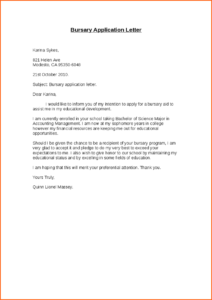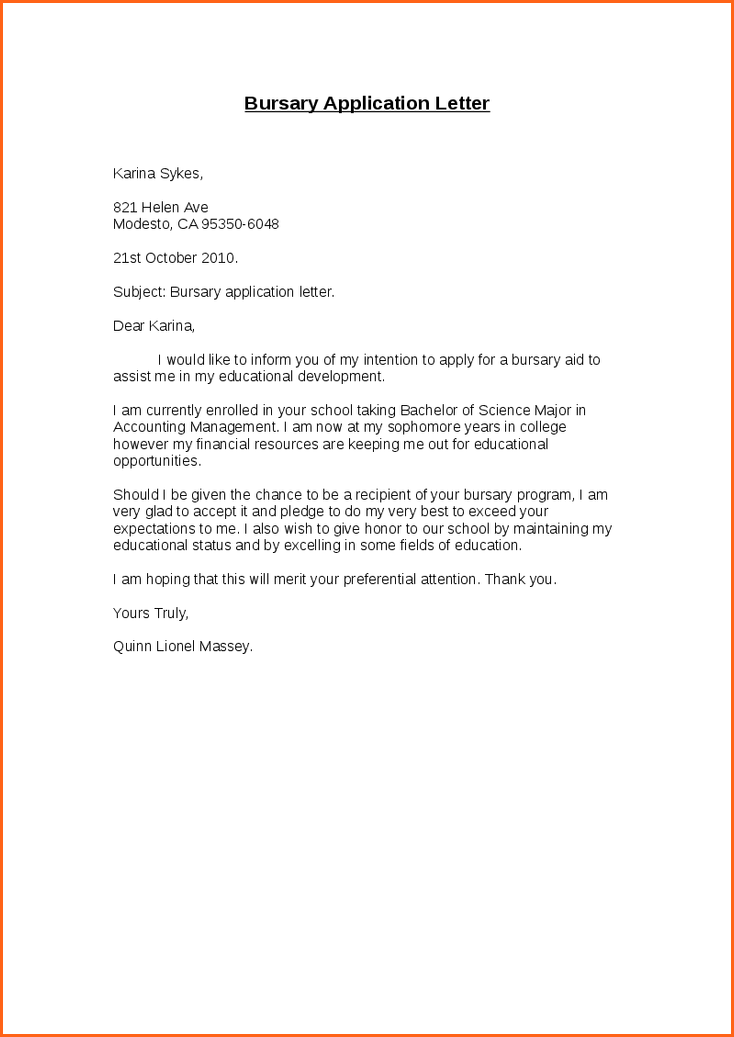Bursary Cover Letter Example: Crafting a Persuasive Application
Applying for a bursary often requires submitting a cover letter detailing your qualifications and need for funding. This document is frequently your first chance to make an impression on the selection committee.
Therefore, crafting an outstanding bursary cover letter is crucial for setting yourself apart from other applicants. Use this guide to learn how to structure a compelling cover letter, articulate your achievements, and maximize your chances of securing financial assistance.

ALSO SEE:
Crafting a Persuasive Bursary Application Letter – Sample Included
Crafting a Compelling Bursary Motivational Letter – Tips and Examples
Learn How to Secure a Full Bursary in South Africa – Step-by-Step Guide
Bursary For Private Colleges 2024/2025
Bursary For Teaching 2024/2025
Understanding the Basics
A bursary cover letter introduces yourself professionally and persuades the provider that you are a worthy recipient of funding. The goal is to showcase your background, accomplishments, passions, and need for financial support.
Researching the Institution
Thoroughly research the institution and specific bursary program to understand their mission and values. This enables you to tailor your content to show how you align.
Addressing Personal Qualifications
Use your cover letter to highlight your academic record, extracurriculars, relevant skills and experiences that exhibit your capabilities and potential.
Structuring the Bursary Cover Letter
Introduction
Craft an engaging opening statement and mention the specific bursary you are applying for.
Body
Narrate key achievements and goals. Link your accomplishments to future aspirations enabled by this funding.
Conclusion
Summarize main points and express gratitude for consideration of your application.
Tailoring for Specific Bursaries
Adapt your letter to align closely with each bursary’s priorities and requirements. Emphasize your relevance.
Addressing Potential Concerns
Proactively explain any academic performance gaps or lack of experiences. Focus on the positive.
Showcasing Financial Need
Articulate your financial situation and need for support without over-emphasizing hardship. Provide documentation if required.
Professional Tone and Language
Maintain formality using excellent grammar and vocabulary. Avoid slang, clichés and common errors.
Seeking Feedback
Ask mentors and peers to review your letter draft. Revise based on constructive feedback.
Formatting Guidelines
Adhere precisely to all formatting specifications provided. Consider appropriate font, spacing and letter length.
The Submission Process
Follow instructions carefully for online or mailed applications. Send a follow-up email to professionally confirm receipt.
Common Mistakes to Avoid
Steer clear of generic statements without examples. Do not let financial need overshadow your accomplishments.
Bursary Cover Letter Checklist
Validate you have a compelling introduction, refined body content, impactful conclusion, proper tone/formatting, and meet all requirements.
Crafting an Email Application
For email applications, include the proper subject line. Format your content clearly in the body per guidelines.
Bursary cover letter example
Here is an example bursary cover letter that can serve as a template:
Your Name
Your Address
City, State Zip Code
Date
Name of Bursary Committee
Bursary Program Name
Address City, State Zip Code
Dear [name of contact person or committee]:
I am writing to apply for the [name of bursary] offered through [name of institution or organization]. I am currently in my [year of study] pursuing a Bachelor’s degree in [your major] at [name of university]. After researching your bursary program and its values of [core values], I believe I am an excellent candidate for this financial assistance.
Throughout my academic career, I have consistently demonstrated [key achievements like high grades, awards, test scores]. For example, I [examples like graduated top of my high school class, won a national math competition, speak three languages fluently]. Beyond academics, I have been involved in various [extracurriculars or community activities] including [list involvement and any leadership roles]. These experiences have allowed me to develop [relevant skills] while giving back to my community.
In terms of financial need, I come from a low-income household with [details of financial situation or hardships]. This bursary would enable me to [explain how it will concretely help you pursue your studies]. After graduation, I aspire to [future career goals] and believe the education made possible through your funding will help me achieve my dreams of [making an impact in your field].
I appreciate you taking the time to consider my qualifications for the [name of bursary] bursary program. It would be an immense honor to be chosen as a recipient. Please find attached my transcript, letters of recommendation, and other required materials for your review. Let me know if you need any other information. I look forward to hearing from you soon.
Sincerely,
[Your signature]
Your Name
Summary
A tailored, high-quality cover letter can make you stand out. Remember to showcase your fit, highlight achievements, and convey passion. With focus and persistence, you can craft letters that open doors to life-changing opportunities.
Frequently Asked Questions (FAQs)
What is the ideal length? 1-2 pages is recommended. Follow any explicit guidelines provided. Quality content is most important.
How can I demonstrate passion? Share personal stories and anecdotes that provide insights into what drives your dedication and interest in your chosen field of study.
What if I don’t meet all the criteria? If you miss one or two minor requirements but are still a strong applicant, it may be worthwhile to apply. Emphasize the areas where you excel.
Are handwritten cover letters acceptable? Typed, printed letters are preferred for legibility. But a handwritten letter can demonstrate additional effort. Ensure it is neat and legible.
When should I follow up on my application? Wait 2-4 weeks after the application deadline to follow up. Send a polite email inquiring about application status.
Conclusion
Applying for bursaries takes time and dedication. But the financial support and opportunities made possible are immensely worthwhile. Craft each cover letter with care and passion. Strive for excellence, pursue feedback from mentors, and reflect the values of your chosen institution. With focus and perseverance, your bursary application letter can help turn your dreams into realities.

